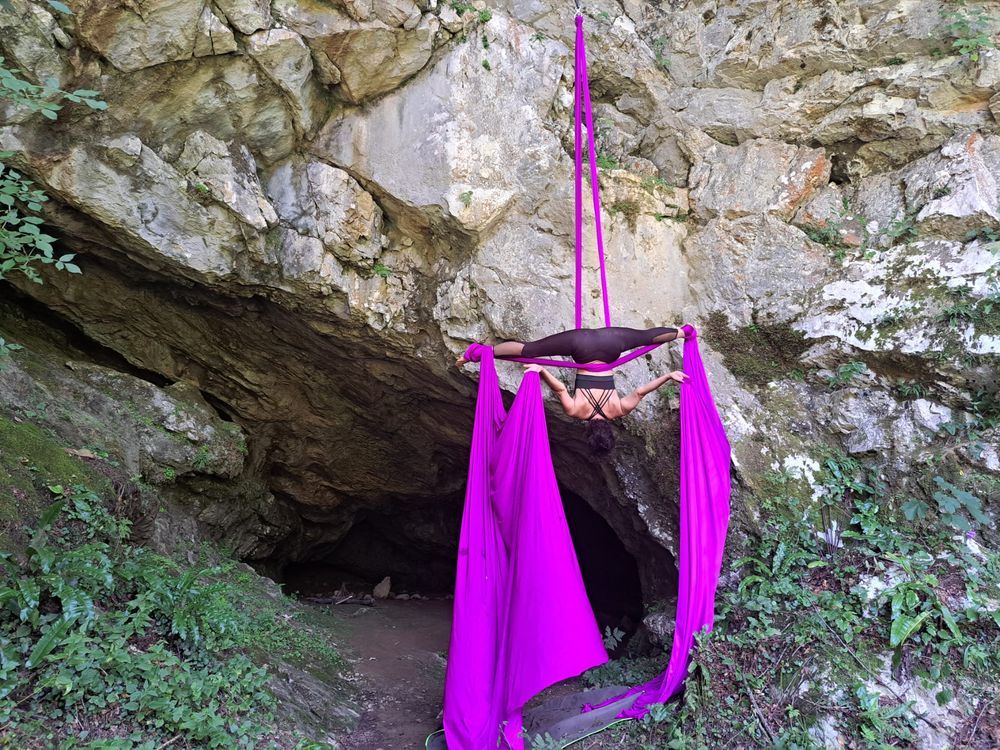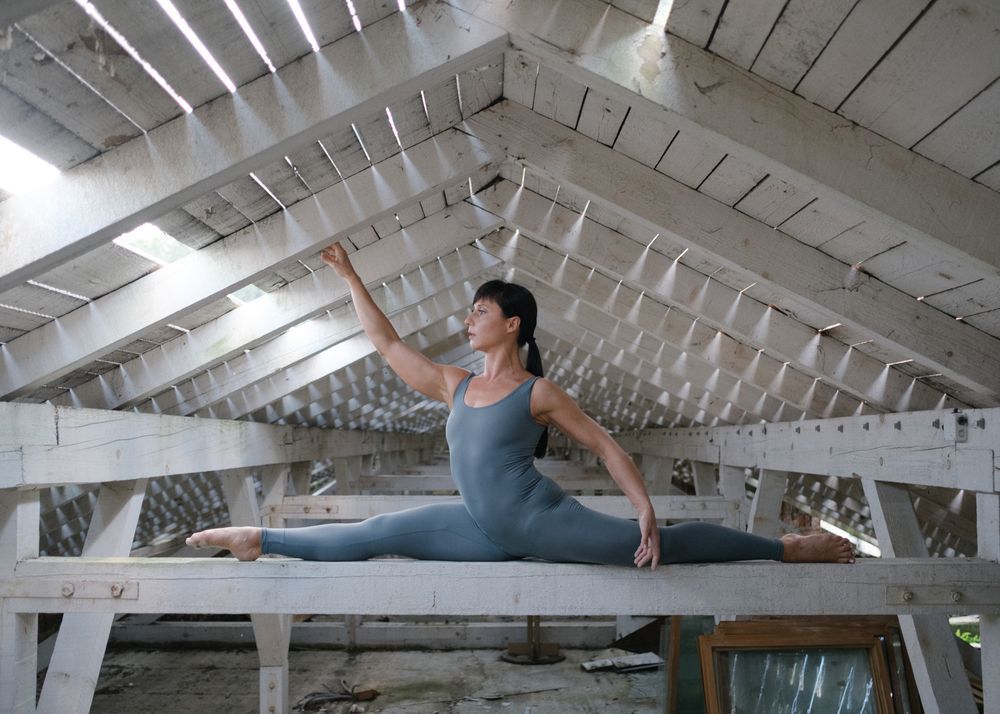 Journeys
JourneysCan Cave Exploring Turn Back the Clock?
Ana (61) credits her youthful energy to spending time in nature, around younger people, and finding joy in everyday things. Read on to discover more about her inspiring life and unique experiences.

By Vanja Maganjić

Andrea is a truly inspiring individual who has navigated a successful transition from a career in ballet to becoming a passionate advocate for healthy living. Her personal experiences with physical pain, disordered eating, and an unsustainable lifestyle have led her to a deeper understanding of the connection between the body and the mind.
You have a very interesting story. After a successful dancing career, you made a complete 180 into healthy living. Can you explain what led you to that decision?
Ballet left a mark on my body, let's just say that. I had pain all over and when I would go to the doctor, they would tell me I was fine.
But I knew that my body was being pushed to an unreasonable limit and since my parents are in sports and medicine, I knew that what I was experiencing wasn’t normal.
My blood panels were great and I was very rarely sick (I don’t think I was ill since college actually), but I was in a lot of pain.
That’s when I started experimenting with some physical activity different from ballet. I focused more on mobility and strength training in order to bring my body back to a healthy state.

I started attending workshops and I met a lot of people who inspired me to learn more about my body. The study of anatomy is far more interesting to me than the study of space, even though we put a lot of time and effort into space research.
I think there is so much more we could learn about our bodies and that’s a big zone of interest for me.
The more we learn about our anatomy, the better we can socialise and find our place in society. If you are disconnected from your body and mind, it’s hard for you to relate to others.
You talk very openly about your past struggles with eating disorders. How did you manage to create a healthy relationship with food?
The first step is realising that you have a problem, which isn’t easy. We live in a world where problematic behaviour has been normalised. An example - going for a run just because you ate a big meal or fasting because you ate a bit more yesterday.
That’s definitely a sign of a strained relationship with food.
Also, a lot of people classify food into good and bad. Sometimes, I meet people who proudly tell me they don’t eat bread, pasta and sweets, but my question is why?
I always tell them that if they want to lose weight, they can do it while still eating bread.
I feel like the more variety of food we have at our fingertips, the more we restrict ourselves. We have to realise that the food is not the problem, we are.
I’m open about my eating disorder because I want other people to know that those thoughts and habits are bad for them. Especially if they feel the need to constantly bodycheck themselves, or think they should stay inside if they feel fat on a given day.
Unfortunately, a lot of people live with that mindset, and over time, those thoughts come to a boil. Sometimes, it can manifest in a physical way.
What if that one food you’re restricting is the exact thing you need because it’s full of vitamins or minerals?
A good example is fat. Women will avoid eating fat so that they don’t become fat. But instead, they could lose their menstrual cycle or even create a thyroid problem.
That’s why education is so important, especially when partnered with therapy. Once you accept that you have a problem, you have to understand what your triggers are and how to work through them.
A lot of time, a strained relationship with food has nothing to do with food. It could be something from your childhood, that you’re subconsciously avoiding dealing with.

It can be a hard road to recovery, and I think that you never truly heal from an eating disorder, you just learn to control it.
The only alternative is to move into the woods, where you can escape mirrors, other people's comments, social media…
I always joke with my friends that no matter where in the world our grandmothers grew up, they all have the same story of weighting themselves on their wedding day and they all had 50 kg, which sounds very fake to me.
That’s such a big problem because we were all raised to think like this, especially in the 90’s. It was completely normal for a woman to show up to a singing show and for one of the judges to tell her that she needed to lose weight in order to have a music career.
Women were always labelled based on what they looked like. And back in the 90s, magazines were a huge thing. Luckily, they had a shorter shelf life than social media, in the sense that you would buy one, read it and then throw it away, but still, they wrote so negatively about women.
A lot of us would end up comparing ourselves to the women on the covers, which persists even today. As you’re scrolling Instagram, you know that the majority of these pictures are edited, but you still think - Oh I want her legs.
The visual input can override your thoughts and opinions, so even though you’re aware of Photoshop and Facetune and filters, you’ll internalise the picture that’s in front of you.
Exactly, the connection between your mental and physical health is something that should be talked about more.
Well, here’s how I see it. We are only clinically dead once our brains die. That’s a great indicator of how important our thoughts and the nervous system in general are.
Everything that defines you is regulated by the brain, so of course it affects your health as well. We have to make sure that the chemicals in the brain are balanced out so that we can function. Luckily we can influence change in the brain with physical activity.
A good example is when you wake up and just feel bad for no reason. You slept well, and you don’t have any big problems weighing you down, but still, you woke up not feeling 100%.
I know that I can raise my serotonin with physical activity, so I do some yoga, even though I don’t feel up to it. But after some time, I will start feeling amazing.
Unfortunately, not everyone has access to this information, which is why sharing these things is so important.
Can you share your chronological age and your GlycanAge?
When I did my first test, I was 39 and my GlycanAge was 56. Six months later, I brought down my GlycanAge to 50.
I’m sure that the result was even higher 6-7 years ago when I first started focusing on my health. Before that, I was overexercising, had a very restrictive diet and my cycle was out of wack.
So we’re not sure if this drop in biological age that happened in the last 6 months was because of all the good work I’m doing or because I started taking HRT.
What kind of HRT are you taking?
I haven’t had a period in 6 years because of hypothalamic amenorrhea. My hormone levels are completely fine and nothing indicates perimenopause.
But since I was putting so much stress on my body for so long, it decided that reproduction wasn’t a priority for me so my reproductive system shut down.
That’s why my gynaecologist gives me a specific form of therapy that stimulates my hypothalamus to produce the hormones that should be produced on given days of the cycle. My body does make hormones, but not at the right time.
With this therapy, my biological age went down, but unfortunately, I’ve experienced some negative side effects. My old ballet injuries would get inflamed again, so I wouldn’t be able to work out.
I also slept poorly, which both my smartwatch and Oura ring show.
Now, I’m gonna take a break from HRT and test again in 6 months to see if it affects my biological age.

What are your future plans?
I would love to preserve my muscle mass. It’s so important for women and the majority of men.
Secondly, I would like to stay cardiovascularly healthy. I noticed that as I age, cardio is harder for me to do. That’s why I reduced the amount of cardio exercises I do.
I want to be more social. I’m a huge extrovert, but as I get older, I tend to spend most of my time with the same group of people. I’ve put quality over quantity, especially since I have a lifestyle that is out of the norm.
I go to bed early, I don’t drink or smoke so having social interactions with new people is hard. Even though I don’t judge them for their choices, I think that they feel judged.
This is a very Croatian thing, I don’t experience this in Bali, which is why I love spending time there.
In Bali, I’m free from social expectations. They don’t drink as much as we do and the way they socialize is completely different. Alcohol isn’t always a part of every celebration like it is back home.
I see that I feel better when I’m around people, but since I work from home, I spend a lot of time alone. I want to get back to being a social butterfly.
What is your advice for someone who is at the start of their longevity journey?
Take baby steps. Visualize your end goal as the top of a mountain, but don’t look at the peak, keep your eyes on your feet.
If you have a list of 10 things you want to achieve, focus on the 2 that you can actually see yourself doing for the rest of your life.
Make sure they are attainable. Maybe instead of going to the bathroom that’s on your floor in your place of work, take the stairs to the one above.
By doing something every day, you will eventually climb your mountain. But also, maybe the end goal isn’t the top of the mountain, maybe it’s a plateau that has everything you need to feel good about yourself.
To find out more about Andrea, check out her Instagram page.

By Vanja Maganjić

Start or continue your GlycanAge journey
Don’t be afraid to reach out to us and ask questions, provide commentary or suggest topics.
Other articles you may like:
 Journeys
JourneysAna (61) credits her youthful energy to spending time in nature, around younger people, and finding joy in everyday things. Read on to discover more about her inspiring life and unique experiences.
 By Vanja Maganjić
By Vanja Maganjić Journeys
JourneysDiscover how our CEO Nikolina Lauc turned personal trauma into a powerful journey of healing and resilience. In this candid interview, she shares insights on mental health, the impact of stress on our daily lives, and her vision for the future of the longevity industry.
 By Vanja Maganjić
By Vanja Maganjić